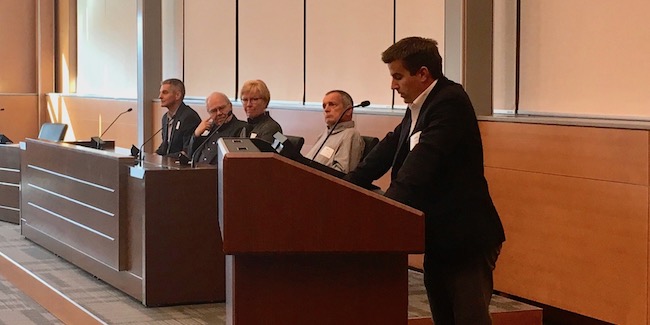This is our last Board of Directors meeting report until September, and Dan Brown’s last president’s report. We’ll continue posting here and emailing members over the summer about policy development and other issues as they evolve.
President’s report
-dan brown
This will be my last report as FAUW president, and this board meeting will be the last for FAUW’s vice-president Johanna Wandel, treasurer Brent Matheson, at-large representatives Narveen Jandu and Dina Dawoud, and Engineering representative Alfred Yu. I’m extremely grateful to all of these colleagues for their service! I’m also looking forward to seeing what the new board makes happen, with Lori Curtis moving into the president’s role.
The news from the past two weeks has been especially grim, with the discovery of a mass grave at a residential school in Kamloops, BC, and with the murder of a Muslim family living in London, Ontario that has been declared a hate crime. At times, it’s overwhelming to me just how much work on reconciliation, dialogue, and changing our society must happen; at other times, I’m excited by just how much better our society can become.
This week is Convocation. Normally, it’s one of my favourite events of the year, and it’s hard to believe we have had two years of these being done online. I hope that we can return to hooding our graduates soon, and sending them off into their careers. It’s also the last week of Convocations with President Hamdullahpur as one of the presiding officers.
We heard some updates about teaching plans for fall at the town hall on Tuesday. I’m hopeful that COVID cases become less prevalent as vaccination starts to take effect here in Waterloo Region. Our colleague Mario Ioannidis continues to meet with relevant people from HR and other offices across campus as part of a taskforce on returning to campus.
What else we talked about
The Board received a draft of Policy 57 – Employee Accommodations for a preliminary review. Faculty Relations Committee will discuss the draft this week, and once it receives support in principle there, it will go out for wider consultation. Our representatives on the Policy 57 Drafting Committee are Jay Dolmage and Lori Curtis.
Vershawn Young updated the Board about the development of a Black Studies program at Waterloo. The Black Studies Implementation Team submitted two new diplomas to the Arts Undergraduate Affairs Group on June 3: General Black Studies diploma and Fundamentals of Anti-Racist Communication. Since then, they submitted a fulsome report and recommendations to senior University administrators. Young suggested FAUW could support four of the Implementation Team’s recommendations in particular:
- Implement an advising system to keep track of students enrolling in and matriculating through the two Black Studies diplomas.
- Establish and task a team to develop and implement the Black Cultural Centre.
- Transfer the Lecturer lines of current Black Faculty into tenured and/or tenure-track lines.
- Appoint Black Studies Programme Director and Advisory Board to Participate in University Black Cluster Hires.
We approved new members of FAUW standing committees, starting July 1:
- Equity Committee: Jay Dolmage will continue for another year as chair. Mario Boido, Barbara Schmenk, Elizabeth Meiering, and Antonio Muñoz Gómez (LAAUW) are joining the committee.
- Lecturers Committee: Su-Yin Tan has been re-elected for another two-year term as chair. Sarah Ruffel (SCI)l, Laila Rohani (ARTS), Elena Neiterman (HEALTH), Jenny Howcroft (ENG), and Rania Al-Hammoud (ENG) will join the committee.
- The Executive Committee (and Faculty Relations Committee representatives) for the next year will be Lori Curtis (President), Kate Lawson, (Vice President), Heidi Engelhardt (Treasurer), Trevor Charles, and Mario Ioannidis.

